I spent a good chunk of my life living in China (in an expatriate bubble, mostly), and my family still lives there, so I go back pretty often. Now the thing about a developing country that’s undergoing said development at a rate like China’s is that every time I go back, lots of things seem to have changed here and there, even if it had only been six months to a year since my last visit.
During my trip back home in May, however, this phenomenon was more pronounced than ever. Sea change, unlike anything I’d ever seen, had taken place in the form of legions of colourful bicycles. The capital city, and indeed every other major city in China, had been taken by storm.
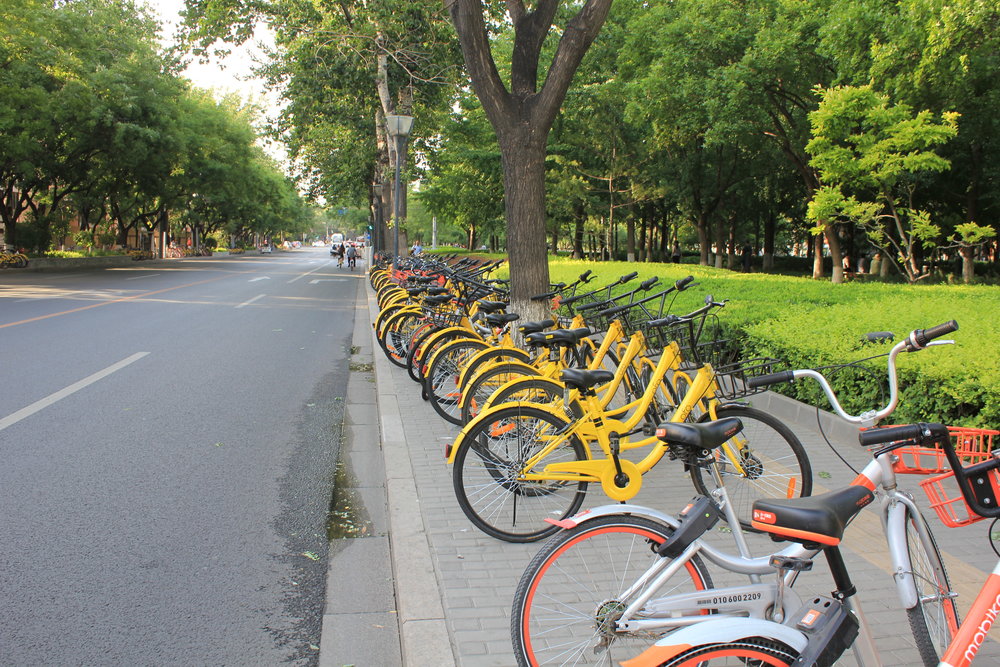
Mobile bike sharing in China
You see, a billion-dollar startup community has developed in China during the past year or so, concentrated on “smart bike-sharing”. Several competing firms, all backed by big money and setting themselves apart by little more than distinct colours in their branding, have transformed China’s bustling streets into a rainbow of two-wheeled transportation.
The biggest firms in the game right now are Mobike (orange, so named as a portmanteau of “mobile” and “bike”) and Ofo (yellow, so named ingeniously as a stylistic representation of a bicycle). There’s also smaller players like Bluegogo (blue) and Unibike (light blue), and dozens of others.
How It Works
The basic idea is that the bike-sharing systems are “dockless”, so there are no docking stations like you’d find with bike-sharing schemes in other major cities like Toronto’s Bike Share, Vancouver’s Mobi, or London’s Santander Cycles. Instead, bikes can be parked and picked up anywhere on the streets, and the customer operates the whole thing via a mobile app.
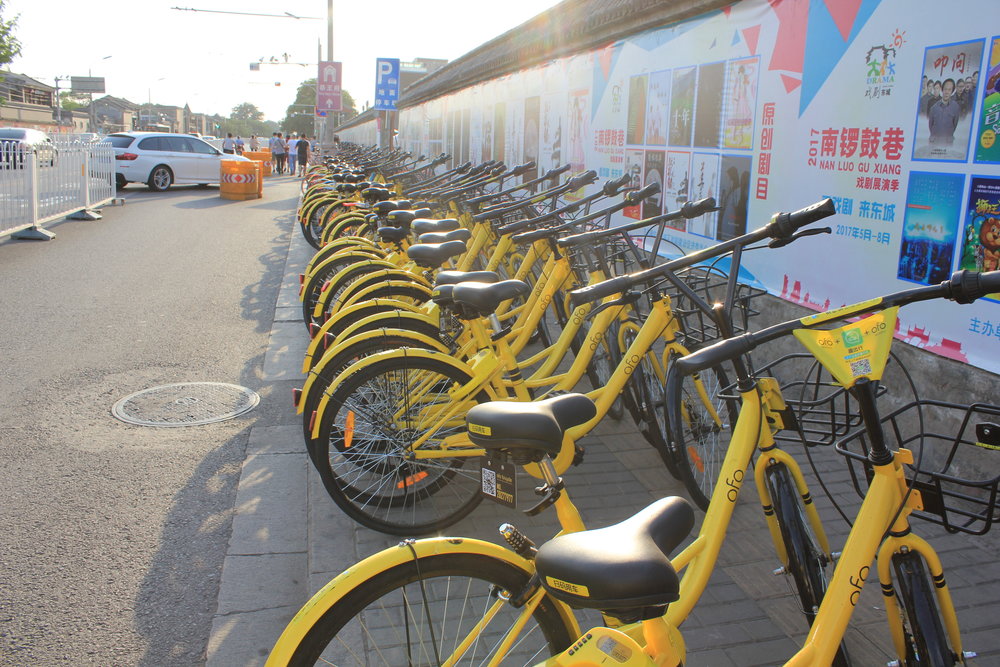
Dozens of Ofo bicycles parked in Nanluoguxiang, Beijing
When you first sign up, you’re required to verify your identity using a cell phone number and a piece of ID. Then, you put down a credit card deposit of ¥99–299 ($20–60) in case of deliberate damage or theft to a bicycle that you’re renting. This is similar to the deposits mandated by more traditional bike-sharing schemes when you first pick up a bicycle at the docking station.
Once that’s done, you’re free to start riding. Note that there’s a few slight differences between Mobike and Ofo, the two most popular apps. While I was in Beijing this time I mostly used Ofo, so I’ll walk you through the process for that.
No matter if you decide to go with Mobike, Ofo, or a smaller provider, the app will show you the location of nearby available bicycles on that bike-sharing network.
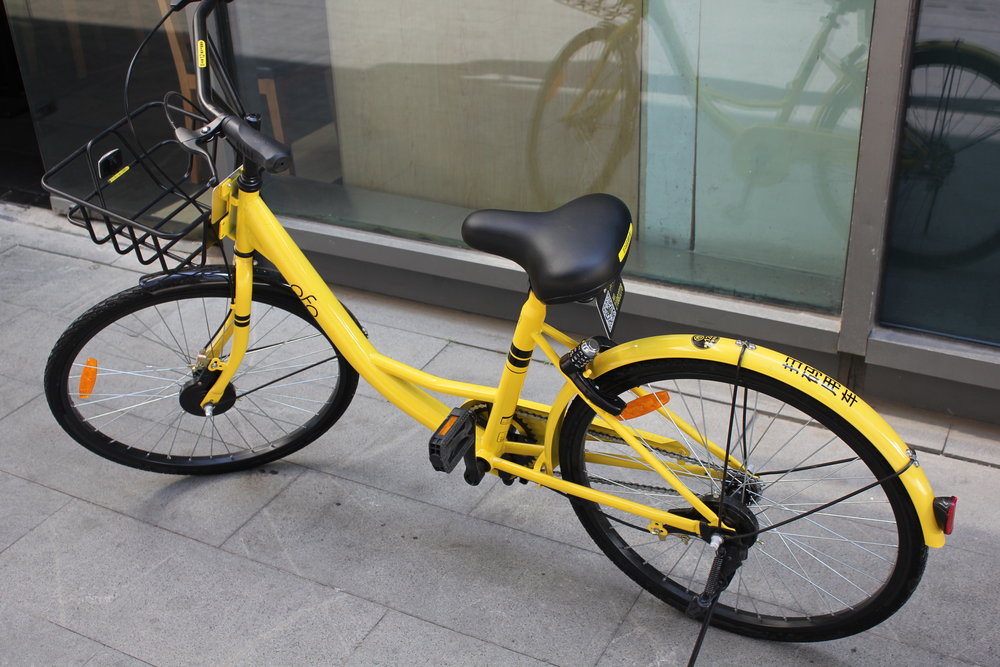
Parked Ofo bicycle, ready to be unlocked
Once you find one, you scan the QR code on the bike using your app.
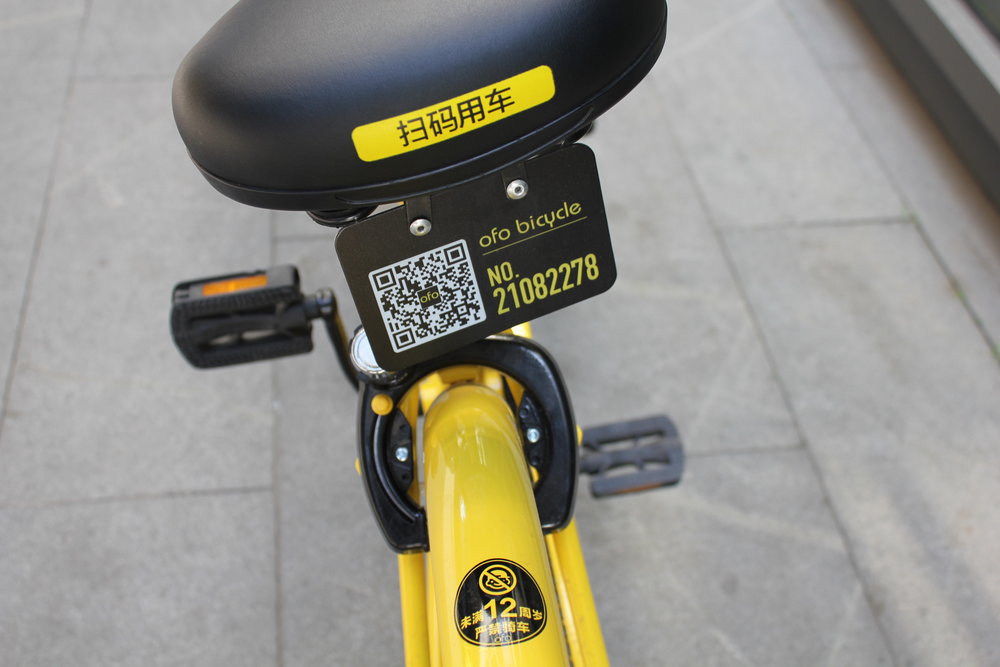
Ofo bicycle – QR code
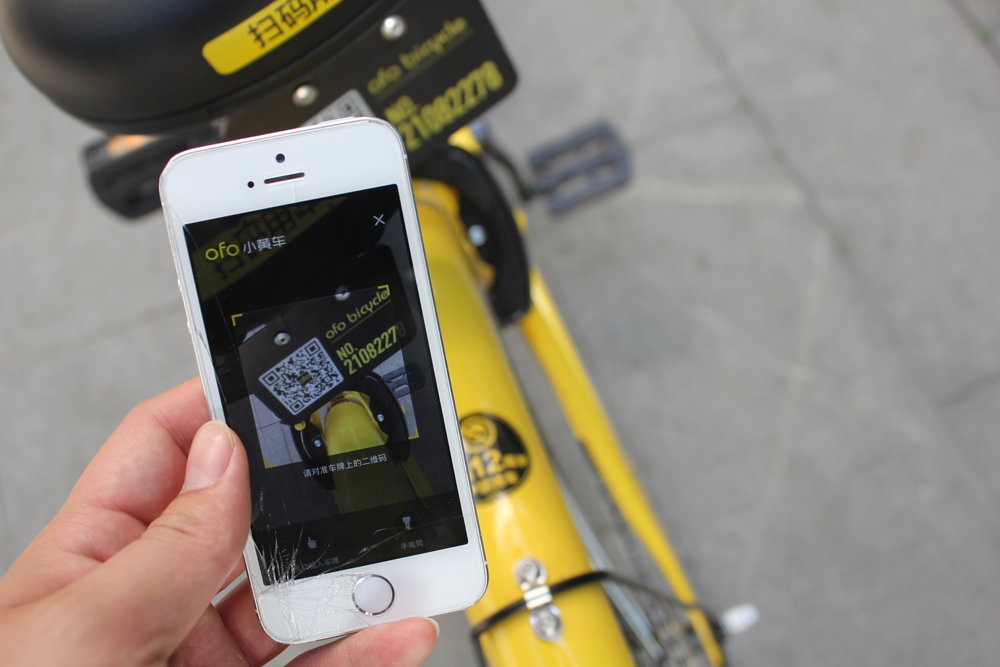
Ofo bicycle – Scanning the QR code
Once the scan is complete, the Ofo app will display a 4-digit combination code.
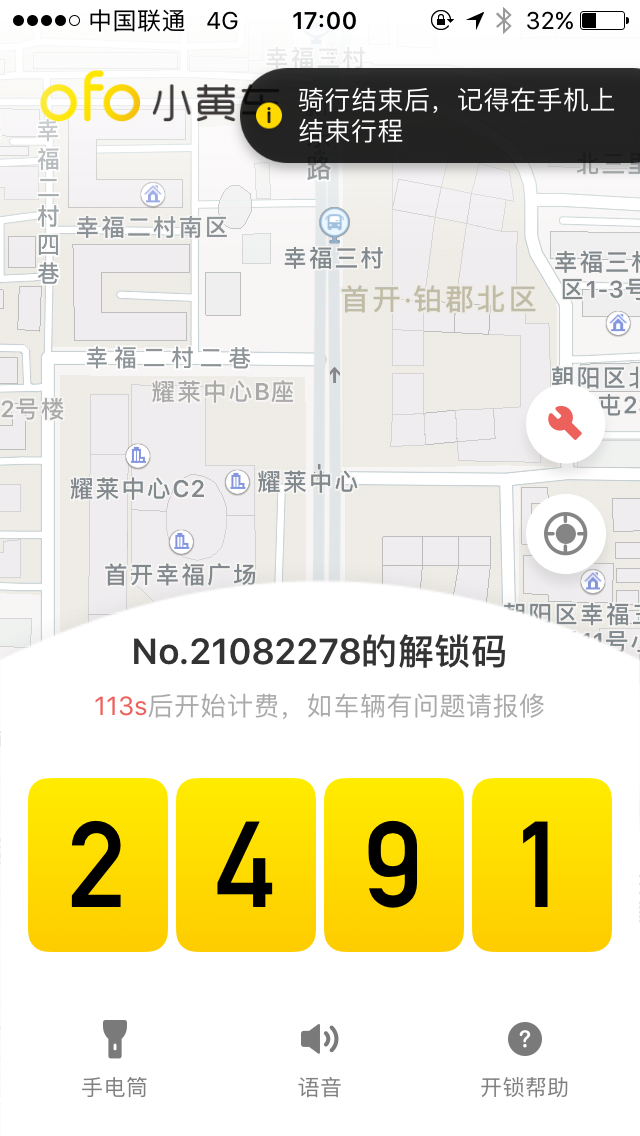
Enter this combination on the dial lock and press the silver button, and the bike lock will snap out of place, unlocking the bike.

Ofo bicycle – Unlocking the bicycle
Now you’re free to ride your bike wherever you want until you reach your destination. All the bike-sharing schemes charge between ¥0.5–1 (10–20¢) for every half hour of use. That’s right, 10 to 20 Canadian cents. Compare that to $7 for each 30-minute block with Toronto’s Bike Share.
What’s more, these apps run promotions quite often where they’ll waive any fees whatsoever, encouraging citizens to get out there and use the bikes.
Since they’re all backed by huge sums of money (Mobike raised US$1 billion in 2017 alone, while Ofo just announced this month a US$700 million round of funding backed by Alibaba), they can afford to provide the services for such little cost in order to build a huge user base.
Once you’ve reached your destination, simply get off the bike, pull the lever on the bike’s lock to lock it up again, scramble the combination dial, and click the “end trip” button on your app. Any fees for your trip will be deducted from your in-app wallet, which you can top-up via your bank card, credit card, or WeChat Pay.
That’s how Ofo works. Mobike, on the other hand, runs a slightly fancier operation. Instead of unlocking the bikes yourself using a combination dial, Mobike users just have to scan the QR code on the bike, and then it unlocks automatically. This is because all of Mobike’s bicycles are equipped with a small GPS and generator, allowing them to be electronically and remotely unlocked.
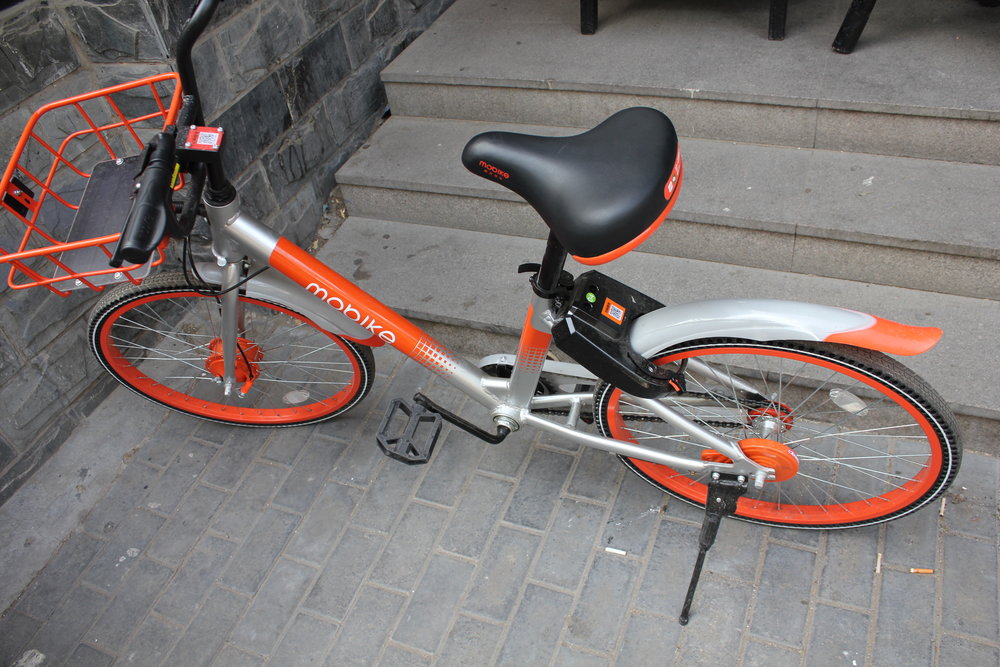
Mobike bicycle
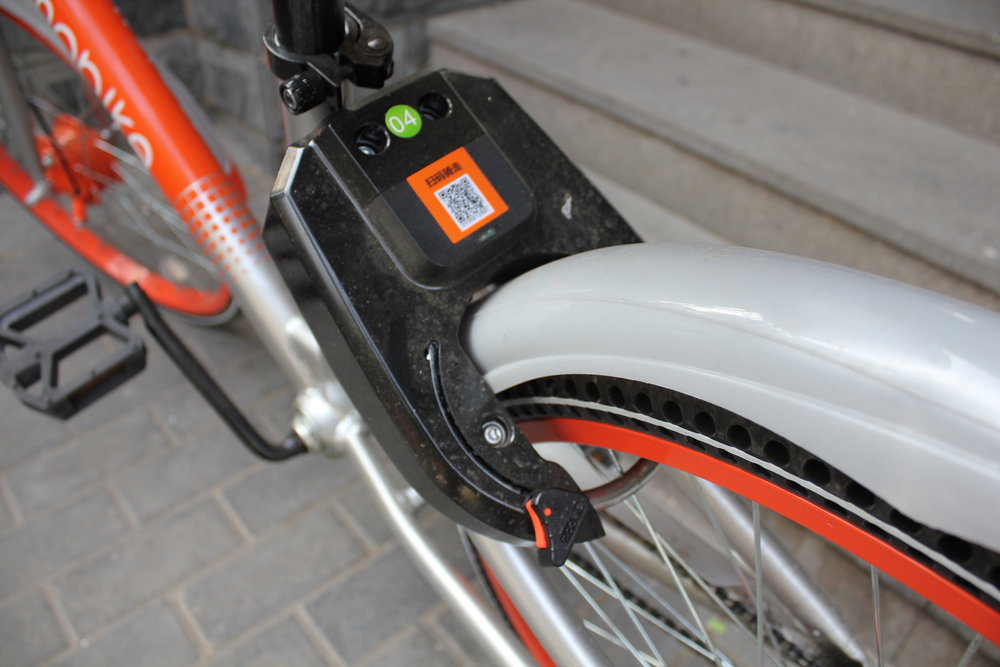
Mobike bicycle – QR code and automatic bicycle lock
With any of the apps, if there’s a malfunction at any step in the process (such as you can’t get your bike unlocked or a bike is functionally broken), you simply report the issue in the app and move on to the next bike.
On the other side of the coin, if you try to use a bike that’s been tagged as out-of-commission by several users, the app will alert you and advise you to find another bike.
Spread and Impact
Intrigued by their overnight takeover of the capital, I did some research on just how far this bike-sharing revolution had spread. It turns out that “far and wide” doesn’t begin to do it justice. Dozens and dozens of Chinese cities now play host to these services, not least the major cities like Beijing, Shanghai, and Guangzhou.
Mobike has since become the world’s largest operator of a bike-sharing scheme, launching its service internationally in Singapore and Manchester in just the last couple of months. Ofo has gained a foothold in the UK as well in Cambridge this March. Bluegogo is considering a launch in Seattle.
News of the explosion of colourful bikes in China and their wild success has spread around the world quickly, and many competitors are popping up in the US and Canada. Limebike and Spin are two examples of such companies in the Silicon Valley region, and just a few weeks ago, Jessica and I freaked out when we saw a Dropbike – practically a Mobike lookalike, and charging an initial price of $1/hour – parked in Toronto. Mobile bike sharing is coming, folks, and I for one can’t wait.
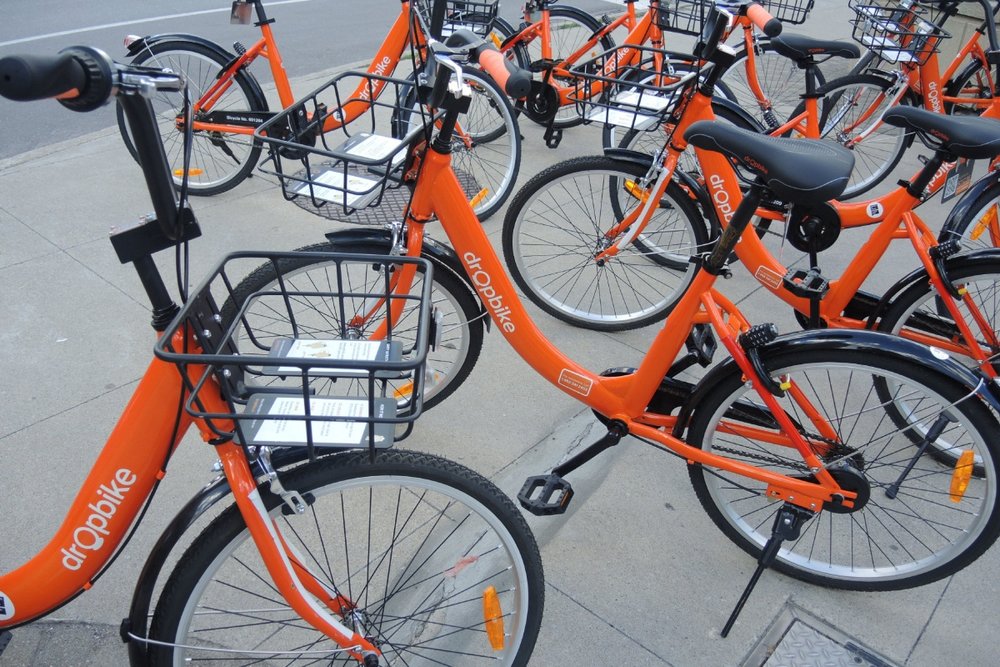
Dropbike bicycles in Toronto
The impact that these services have brought to daily life in China is considerable. People of all ages are using these bikes to get around short distances.
In fact, as Mobike puts it, their goal is to solve the “last mile problem”: while public transportation in China is widely used and well-operated, there are still plenty of places that require, say, a 20-minute walk to reach once you’ve gotten off the subway. That can be too far a walk for many, yet too close to justify hailing a taxi, and that’s where Mobike and Ofo come in.
China’s bike sharing systems are also certain to play a role in improving transport efficiency, relieving traffic congestion, and introducing an emphasis on healthy and sustainable living, all of which have been or continue to be notable challenges faced by the world’s fastest growing economy. I can also personally attest that it’s just so much fun to ride these bikes, given how colourful and innovative they are!
Of course, the journey hasn’t been without the occasional speedbump. There’s been reports of people forming massive piles of disused bicycles on street corners, which isn’t really a surprise considering the thousands and thousands of bikes that these companies have rolled out. Nevertheless, instances like these definitely call into question how companies are Mobike and Ofo are using their resources.
Expansion efforts in Western markets haven’t exactly been smooth sailing either, since municipalities in the US and Canada are far less likely to condone the introduction of thousands of bikes that can be parked willy nilly on any street corner. The sheer clutter would be far too much of a shock to the system.
Rather, I suspect that we’ll see a more gradual rollout of mobile bike sharing in major cities in the West, with city rules and regulations – such as parking against a bike stand at the very least – playing more of a role.
Conclusion
You’ll be hearing a lot more about mobile bike sharing in the coming months, whether that’s in the form of Chinese companies like Mobike or Ofo making a foray into your city, or local startups imitating the business model. And if you’re heading to China anytime soon, be sure to try them out!
The ingenious new form of transportation is easy and intuitive to use, boasts cheap operating costs thanks to its “docklessness”, and does a great job of weaning us off our reliance on car transport. That’s why I loved using it so much on my recent trip back home to Beijing, and I look forward to exploring more places on two wheels as the concept takes hold in cities around the world.




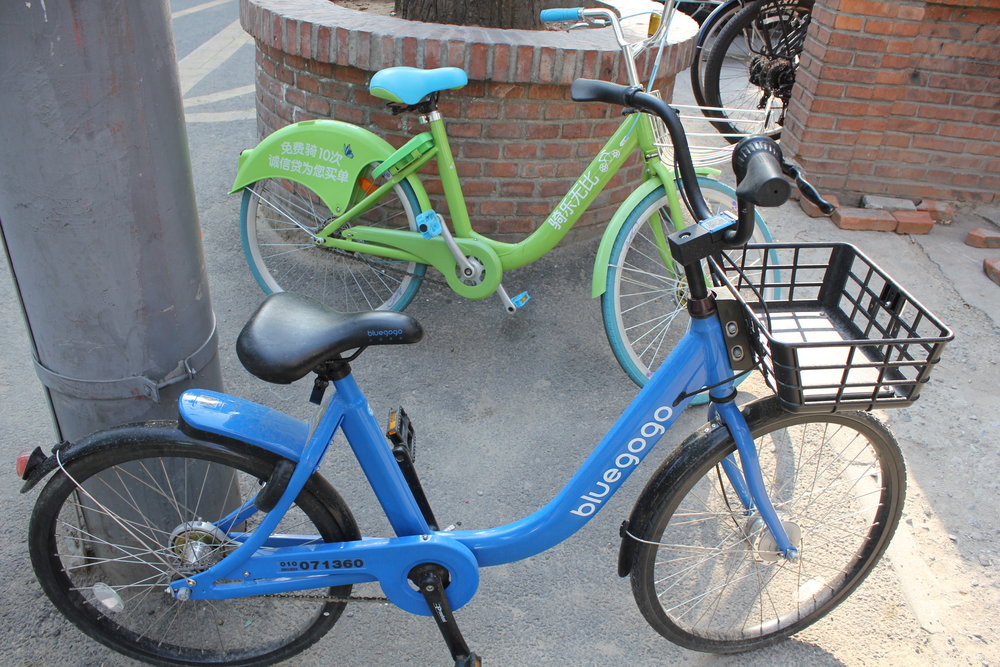














This is a great service, they now have almost every European city and it is very convenient if you do not have your bike. Luckily, I travel with mine all the time and drive it on my thule bike rack hitch.